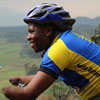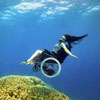| |
|
|

|
|
ATLAS |
|
|
Assistive
Technology
Laboratory
at
Stanford |
|
|
|
Technology
and design benefitting individuals with disabilities and older adults in the
local community |
February 26, 2016 |
|
|
|
|

Perspectives is the newsletter of the
Stanford course,
Perspectives in Assistive
Technology.
This issue invites you
to screen these films.
Perspectives in Assistive Technology is a Winter
Quarter Stanford course - now in its tenth year - that explores the design,
development, and use of assistive technology that benefits people with
disabilities and older adults. The schedule
consists of semi-weekly classroom discussions; lectures by
notable professionals, clinicians, and assistive technology users; tours
of local medical, clinical, and engineering facilities; an assistive
technology faire; and a film screening.
Next class
session - Tuesday, March 1st at 4:30pm in the atrium of the
Peterson
Building - please RSVP if you
plan to attend to insure adequate chairs and popcorn
|


|
I Am Able
Film Screenings
Fixed:
The Science / Fiction of Human Enhancement |
|
I Am Able
Abstract: After surviving the genocide in Rwanda, Frederick Ndabaramiye was
the victim of a brutal retribution attack. Left for dead in the jungle, he was
found by two girls who took him to the hospital. His miraculous survival was
just the beginning. Frederick slowly learned to live again, re-honing his motor
skills through painting. After years of recovery, uses his story to empower
others going through similar struggles. Through painting, cycling, and
storytelling, Frederick now seeks to change people's preconceptions of what it
means to be 'able' by encouraging us to focus not on perceived
“disabilities” but on the grit that each of us have. |
|
Fixed Abstract:
What does "disabled" mean when a man with no legs can run faster than most
people in the world? What does "normal" mean when cosmetic surgery procedures
have risen over 450% percent in the last fifteen years and increasing numbers
of people turn to "smart drugs" every day to get ahead at school or work? With
prenatal screening able to predict hundreds of probable conditions, who should
determine what kind of people get to be born? If you could augment your body's
abilities in any way imaginable, would you? |
|
From bionic limbs and
neural implants to prenatal screening, researchers from around the world are
hard at work developing a myriad of technologies to fix or enhance the human
body. Fixed: The Science / Fiction of Human Enhancement takes a close
look at the drive to be “better than human” and the radical
technological innovations that may take us there. |
|
Through a dynamic mix
of verité, dance, archival, and interview footage, Fixed
challenges notions of normal, the body, and what it means fundamentally to be
human in the 21st century. |
|
Biosketch of Fixed's
Fernanda Castelo: Fernanda Castelo, as a "test pilot", helped Ekso
Bionics refine their design for the "Ekso", an exoskeleton which allows
individuals with limited to no mobility in their legs to walk again. Fernanda
worked closely with their engineers, and clinical physical therapists giving
critical feedback from a user's perspective. A dancer at Disneyland in her
youth, after an accident 20 years ago, she has since consulted with multiple
design teams on the development of new technologies for people with mobility
impairments. From the new WHILL, providing mobility, independence and style for
everyone to Ekso to Stanford's Mechanical Engineering Perspectives in Assistive
Technology class mentoring with future engineers, Fernanda educates about the
importance of an organic, body/user-centered approach to design and how
essential it is to involve people with disabilities at every stage of
development. She is also an avid sailor and very active with BAADS (Bay Area
Association for Disabled Sailors). Setting her eyes on the prize and claiming
1st Place at the 2013 North American Access Championship on San Francisco
Bay. |
|
Suggest a project -
Good assistive technology project suggestions are sought for Stanford's
Mechanical Engineering capstone course (ME113) for the upcoming Spring Quarter.
Your suggestions should be based on an observation or experience of a real
challenge faced by individuals with a disability or older adults.
Projects will involve the design and fabrication of a
functional solution to the problem, as well as student team presentations and
reports.
This is a great opportunity for individuals,
organizations, or companies to interact with teams of talented, enthusiastic
seniors, benefit from their fresh perspective, and gain access to university
expertise and resources. Students benefit by having the opportunity to apply
their studies of solid and fluid mechanics, manufacturing, and mechanical
design to a real world problem.
Your first step is to visit the
Project Solicitation webpage for a list
of project requirements and a description of how best to convey your ideas. If
your suggestion is accepted, you will have the opportunity to offer the student
team advice, direction, and expertise in person or by phone and/or
email. |
 |
|
|
Attend a lecture -
Course lectures will be held on Tuesdays
and Thursdays from 4:30 to 5:50pm and are open
to the greater Stanford community. You are most welcome to sit in on class
sessions that interest you. You need not be a Stanford student and there is no
required signup, enrollment, or charge. The class will meet in a large, tiered,
accessible classroom on campus in the Thornton Center, adjacent to the Terman
Fountain and near the Roble Gym, the same venue as last year. Here are the
parking options, maps, and directions to
the classroom. |
 |
|
|
Did you miss a
lecture? - Course lectures are posted on YouTube. To find the links,
browse to the Lecture Schedule webpage,
scroll down and click on the lecture of interest. Near the bottom of the page
you will see the Lecture Material section which has links to the slides,
photos, weblinks, and lecture video. |
 |
|
|
Remaining class
sessions: |
|
|
Would you like to support the
course? - Funding in any amount for the course and student projects
is always welcomed. Monetary gifts support approved project expenses,
administrative costs, honoraria for guest lecturers, and the end-of-term
celebration. Refer to the Team Project Support
webpage for more information.
Do you have a question,
comment, or suggestion? - If you have general questions, comments,
or suggestions about the course, David L. Jaffe, MS, the instructor, can
be reached by email or at
650/892-4464. Thank you again for your interest in the course.
Dave
|

To unsubscribe from this newsletter, please email
Dave. |
|








